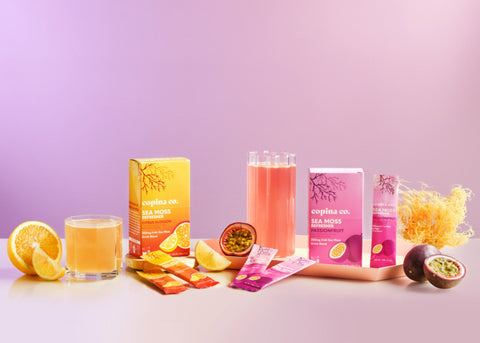You might remember iodine as being a key player on the periodic table. Turns out that isn’t its only role in our life! Iodine helps us support our thyroid and cognitive health, so why haven’t we heard of it that much?
It doesn’t matter whether you are a supplementing goddess or someone who doesn’t know the first thing about iodine. We are here to break down the basics of iodine and how it can be an important contributor to our everyday lives.
What is Iodine?
Iodine is an essential trace element that plays an important role in our health as humans! Sounds important right? It is vital for the proper functioning of our thyroid gland which helps do things like produce hormones that help us regulate bodily functions.
It is important to note that whether you are deficient in iodine or having an excessive intake of iodine can create adverse effects. Iodine deficiency can lead to things like thyroid disorders, cognitive impairments, and other potential health issues. If you are intaking too much iodine-like supplementation, it can also lead to thyroid dysfunction and other health complications. With all that being said, we recommend consulting with a doctor before you take any supplements or try to supplement your own iodine.

The Importance of Iodine
We know that Iodine is important because it helps our thyroid function, which we will get into after this, but what else about it makes it important?
Iodine has other important roles in our day-to-day health. One of them is for our brain! Iodine is important to take note of when pregnant and through early childhood because it is essential for proper brain development in a fetus.*
Iodine helps support the immune system.* Having a healthy immune system is incredibly important to keep note of! Another important way to help your body and its immune system is also with antioxidants. Iodine has potential antioxidant properties.* antioxidants are important because they can protect cells from oxidative stress and damage caused by free radicals.* Antioxidants are also important when it comes to maintaining healthy and glowing skin.*
And last but not least, iodine might help with bone health by supporting the body’s mineral balance and potentially aiding in the absorption of calcium.* Calcium is important for healthy and strong bones.
The Thyroid + Iodine
Iodine is probably most well known for its connection to a healthy and functioning thyroid. If you are experiencing what you think is an imbalance in the body, please consult with a healthcare professional before supplementation of iodine.
The body uses iodine mainly as a way to support the synthesis of thyroid hormones. The thyroid gland will absorb the iodine from the bloodstream and incorporate it into thyroxine, also known as T4, and triiodothyronine, also known as T3. These are the two main thyroid hormones. These two hormones are incredibly important for regulating metabolism, energy, and overall growth and development.
When you intake an adequate amount of iodine, you help maintain the proper size and function of your thyroid gland. If you are not getting enough iodine, your thyroid might enlarge because it is attempting to produce more hormones to compensate for the deficiency in the body. The thyroid interacts with the adrenal glands, which also produce hormones that are connected to the stress response!
Iodine Sources
Other than supplements, there are ways to “eat your iodine” to make sure you are getting some in your diet. This could be through iodized salt, which is iodized table salt that you can simply add while you are cooking or baking.
Other plant-based sources could include:
- Seaweed
- Sea Moss
- Potatoes
- Prunes
- Cranberries
- Iodine-Fortified Foods
- Spinach
- Kale
- Lima Beans
- Sesame seeds
- Sunflower seeds
- Flaxseeds
- Chia seeds
- Whole wheat
- Brown rice
- Quinoa

It is important to note, any plant-based fruit or vegetable’s iodine content depends on the soil or water’s iodine content from when it was growing.
How do you know if you intake enough iodine?
You might have read all of this and thought “Well how do I know if I am sufficient in Iodine?”. The truth is that iodine sufficiency involves a combination of factors like your diet, your own health risk factors, and monitoring if you have any early signs of a deficiency. Here are some ways to think about if you might be deficient in iodine:
- Dietary Assessment
Do you eat any of the foods above that contain iodine? Are they a regular and balanced part of your diet?
- Check Your Food Labels
Are the foods you buy iodine-fortified? Some bread, cereals, and other plant-based milks have iodine added to them.
- Check in with your doctor
If you are able to, consult with a registered dietician or healthcare provider. They can evaluate your diet and ensure you meet your nutritional needs like with iodine. They can also advise you as to the sufficient limits of iodine in your diet so you don’t overconsume it.
- Symptoms of Deficiency
You can watch for symptoms of iodine deficiency like unexplained weight changes, fatigue, dry skin, hair loss, or changes in mood. Your symptoms could be due to a different factor, so it is important if you are experiencing these symptoms to consult with a healthcare provider. They are not definitive of an iodine deficiency.
Iodine is essential, but still, it is important to note that an excess of iodine can still affect your thyroid function. Maintaining a balance is important to ensure that everything is functioning properly. Please connect with your doctor or physician if you have more specific thyroid questions.
Eating a well-balanced and diverse diet can help with keeping iodine levels regular and keeping your thyroid happy.* If you are looking for recipe inspiration to bring into your diet, check out our plant-based and skin-loving recipes.
Did you like this wellness-inspired blog? You’d love these then!
- How Does Vegan Collagen Powder Work?
- What is an Adaptogen?
- Is Coffee Bad for Your Skin?
- Collagen Benefits for Hair
- Fruiting Body vs. Mycelium - Why it Matters










